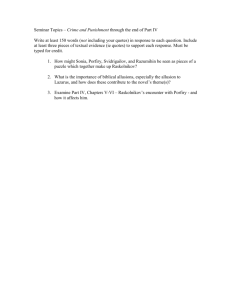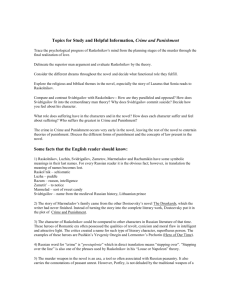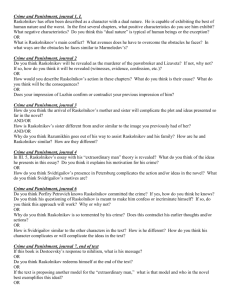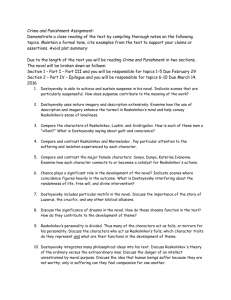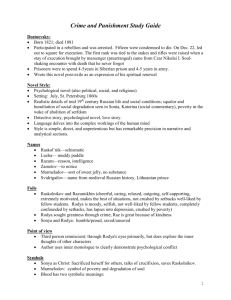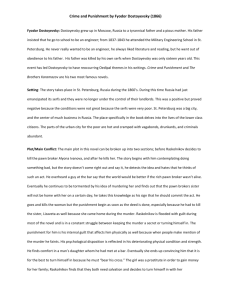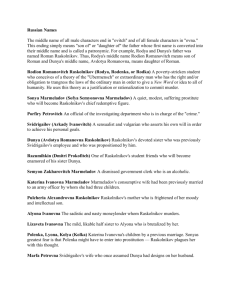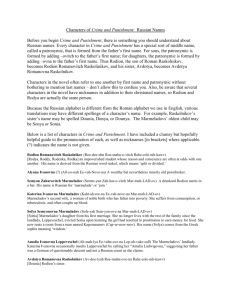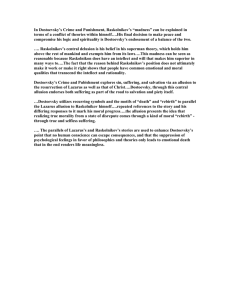Study Questions Crime and Punishment
advertisement
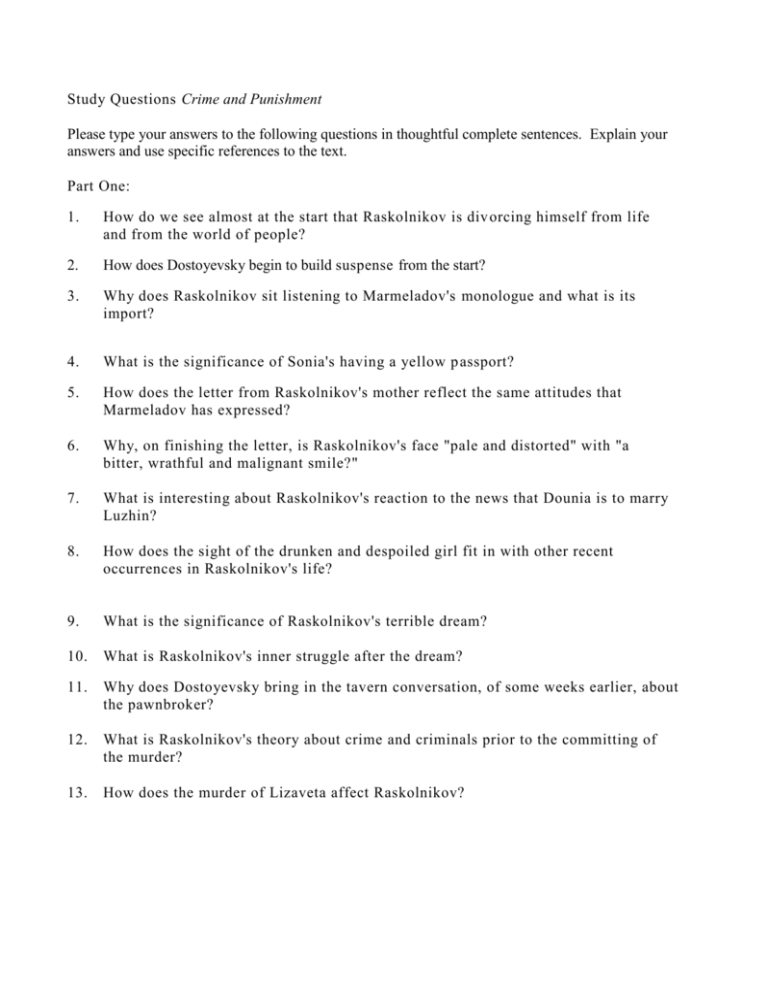
Study Questions Crime and Punishment Please type your answers to the following questions in thoughtful complete sentences. Explain your answers and use specific references to the text. Part One: 1. How do we see almost at the start that Raskolnikov is div orcing himself from life and from the world of people? 2. How does Dostoyevsky begin to build suspense from the start? 3. Why does Raskolnikov sit listening to Marmeladov's monologue and what is its import? 4. What is the significance of Sonia's having a yellow p assport? 5. How does the letter from Raskolnikov's mother reflect the same attitudes that Marmeladov has expressed? 6. Why, on finishing the letter, is Raskolnikov's face "pale and distorted" with "a bitter, wrathful and malignant smile?" 7. What is interesting about Raskolnikov's reaction to the news that Dounia is to marry Luzhin? 8. How does the sight of the drunken and despoiled girl fit in with other recent occurrences in Raskolnikov's life? 9. What is the significance of Raskolnikov's terrible dream? 10. What is Raskolnikov's inner struggle after the dream? 11. Why does Dostoyevsky bring in the tavern conversation, of some weeks earlier, about the pawnbroker? 12. What is Raskolnikov's theory about crime and criminals prior to the committing of the murder? 13. How does the murder of Lizaveta affect Raskolnikov? Study Questions Crime and Punishment Part Two: 1. What does Raskolnikov experience in connection with the bloodstained sock? 2. Does the story of Koch have any effect on Raskolnikov? 3. What is the psychological explanation of Raskolnikov's four-day d e l i r i u m ? 4. It has been said that, of all the characters in the novel, Dostoevsky dislikes only one, Luzhin. How is the author's dislike made evident? 5. What ideas of Luzhin irritate Raskolnikov and why? 6. What is the list of crimes by intellectuals given during the conversation between Luzhin and Raskolnikov and why is it presented here? 7. What does the conversation between Raskolnikov and Zametov in the restaurant reveal about Raskolnikov at this point? 8. What is the significance of the suicide attempt that Raskolnikov w i t n e s s e s ? 9. What does Raskolnikov do in revisiting the scene of his crime? 10. Why is it fitting for Marmeladov to die in Sonia's arms? 11. What is Raskolnikov's statement to Nikodim Fomitch on leaving the Marmeladov's and why is it "ironic"? 12. What immediate effect does the death scene have on Raskolnikov and why? 13. Why does Raskolnikov faint when he sees his mother and sister? Study Questions Crime and Punishment Part Three: 1. In what condition is Ruzumikhin when he first meets Raskolnikov's mother and sister? What does his behavior at this time reveal about him? 2. What is Dounia like? 3. What sort of woman is Pulcheria Alexandrovna? 4. How accurate a description of Raskolnikov does Razumikhin give? 5. How does Raskolnikov behave during his second interview with his mother and sister and what does his behavior reveal about him? 6. How does this scene provide an example of the disparity between internal and external lives in a Dostoyevskian character? 7. Indicate some other examples of the disparity between internal and external lives in other characters in this novel. 8. What do Raskolnikov's comments about the girl he was to marry demonstrate about him? 9. What is so shocking about Raskolnikov's reception of Sonia? 10. What is the socialist's explanation of the cause of crime and what opinion does Razumikhin express about this theory? 11. If Razumikhin is speaking for the author here, what would the Soviets' attitude toward Dostoyevsky have been? 12. At the conclusion of Raskolnikov's explanation of his magazine article, what is the significance of Porfiry asking about the belief in Lazarus' rising from the dead? 13. Why is the senseless terror experienced by Raskolnikov so s i g n i f i c a n t ? Study Questions Crime and Punishment Part Four: 1. Why does Luzhin become so offended during the interview with the Raskolnikovs? 2. Why does Svidrigailov make such comments to Raskolnikov as "we are birds of a feather" and "there is something about you like me"? 3. Does the reader feel any sympathy for Svidrigailov? 4. How does Luzhin react to Dounia after she rejects him and why? 5. What is the significance of Raskolnikov's bidding his relatives farewell? 6. Why does Raskolnikov want to hear the story of Lazarus? 7. How does Porfiry work on Raskolnikov during their interview at his office? 8. What are we shown by the last paragraph of this part? Study Questions Crime and Punishment Part Five: 1. Is there any similarity in how Dostoevsky characterizes many of the adherents of socialism? 2. Explain what effect these characterizations would have upon Stalinists' opinions of his work. 3. Do you agree with Lebeziatnikov's contention that "honorable, useful work" like cleaning out a cesspool is better than the work of a great painter or writer? 4. What portrait of Luzhin emerges from the scene with Lebe ziatnikov? 5. What is the significance of Mrs. Marmeladov spending all the money she does on the funeral dinner? (Why does she do this and what is the result?) 6. What do we see during the funeral dinner about the Russian lower classes of this time? 7. What best shows us Sonia's beautiful character? 8. What is the effect on Raskolnikov's mind of the awareness that Sonia knew Lizaveta? 9. What is Sonia's solution to Raskolnikov's problem? 10. Why are the madness and death of Mrs. Marmeladov introduced at this point? Study Questions Crime and Punishment Part Six and Epilogue: 1. Why does Porfiry Petrovich talk at such length about the proof that psychology offers of the painter's guilt? 2. Why does he urge Raskolnikov to confess? 3. What sort of man does Svidrigailov reveal himself to be during his conversation with Raskolnikov? 4. When Dounia accuses Svidrigailov of jeering by saying that her brother "may become a great man yet," is she right? 5. Some critics have felt that Dounia's having brought a gun with her and, above all, her shooting at Svidrigailov and barely wounding him are both too coincidental and too melodramatic. Thus they find this scene one of the weakest in the book. Do you agree? Why or why not? 6. Keeping in mind the symbolism of water as a source of purification a nd rebirth, what do we learn about Svidrigailov on the last night of his life? 7. What is the important feature of Raskolnikov's musings to himself after he leaves his mother and sister? 8. The Epilogue has been called the poorest part of Crime and Punishment. What justification can be found for this argument? 9. Why is the Epilogue necessary?
